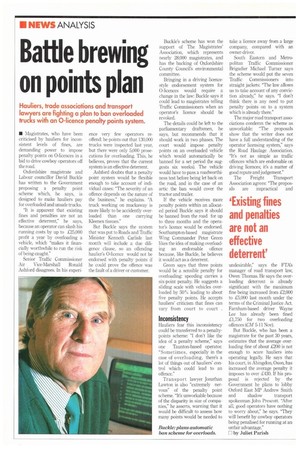Battle brewin on points plan
Page 22

If you've noticed an error in this article please click here to report it so we can fix it.
Hauliers, trade associations and transport lawyers are fighting a plan to ban overloaded trucks with an 0-licence penalty points system.
• Magistrates, who have been criticised by hauliers for inconsistent levels of fines, are demanding power to impose penalty points on 0-licences in a bid to drive cowboy operators off the road.
Oxfordshire magistrate and Labour councillor David Buckle has written to the Government proposing a penalty point scheme which, he says, is designed to make hauliers pay for overloaded and unsafe trucks.
"It is apparent that existing fines and penalties are not an effective deterrent," he says, because an operator can slash his running costs by up to £25,000 profit a year by overloading a vehicle, which "makes it financially worthwhile to run the risk of being caught."
Senior Traffic Commissioner Air Vice-Marshall Ronald Ashford disagrees. In his experi
ence very few operators reoffend: he points out that 130,000 trucks were inspected last year, but there were only 5,000 prosecutions for overloading. This, he believes, proves that the current system is an effective deterrent.
Ashford doubts that a penalty point system would be flexible enough to take account of individual cases: "The severity of an offence depends on the nature of the business," he explains. "A truck working on muckaway is more likely to be accidently overloaded than one carrying Kleenex tissues."
But Buckle says the system that was put to Roads and Traffic Minister Kenneth Carlisle last month will include a due dili. gence clause, so an offending haulier's 0-licence would not be endorsed with penalty points if he could prove the offence was the fault of a driver or customer. Buckle's scheme has won the support of The Magistrates' Association, which represents nearly 28,000 magistrates. and has the backing of Oxfordshire County Council's environmental committee.
Bringing in a driving licence. style endorsement system for 0-licences would require a change in the law: Buckle says it could lead to magistrates telling Traffic Commissioners when an operator's licence should be revoked.
The details could be left to the parliamentary draftsmen, he says, but recommends that it should work in two phases. The court would impose penalty points on an overloaded vehicle which would automatically be banned for a set period (he suggests six weeks). The vehicle would have to pass a roadworthiness test before being let back on the road, and in the case of an artic the ban would cover the tractor and trailer.
If the vehicle receives more penalty points within an allocated period Buckle says it should be banned from the road for up to three months and the operator's licence would be endorsed. Southampton-based magistrate Wing Commander Peter Green likes the idea of making overloading an endorsable offence because, like Buckle, he believes it would act as a deterrent.
Green says that three points would be a sensible penalty for overloading speeding carries a six-point penalty. He suggests a sliding scale with vehicles overloaded by 50% leading to about five penalty points. He accepts hauliers' criticism that fines can vary from court to court .
Inconsistency
Hauliers fear this inconsistency could be transferred to a penaltypoints scheme: "I don't like the idea of a penalty scheme," says one Taunton-based operator. "Sometimes, especially in the case of overloading, there's a lot of things out of hauliers' control which could lead to an offence."
Transport lawyer Jonathan Lawton is also "extremely nervous" of the penalty point scheme. "It's unworkable because of the disparity in size of companies," he asserts, warning that it would be difficult to assess how many points would be needed to
take a licence away from a large company, compared with an owner-driver.
South Eastern and Metropolitan Traffic Commissioner Brigadier Michael Turner says the scheme would put the seven Traffic Commissioners into straight jackets: "The law allows us to take account of any conviction already," he says. "I don't think there is any need to put penalty points on to a system which is already there."
The major road transport associations condemn the scheme as unworkable: "The proposals show that the writer does not have a full understanding of the operator licensing system," says the Road Haulage Association. "It's not as simple as traffic offences which are endorsable on driving licences; it's a matter of good repute and judgement"
The Freight Transport Association agrees: "The proposals are impractical and undesirable," says the VIM manager of road transport law, Owen Thomas. He says the overloading deterrent is already significant with the maximum fine being increased from £2,000 to £5,000 last month under the terms of the Criminal Justice Act. Farnham-based driver Wayne Lee has already been fined £1,750 for two overloading offences (CM 5-11 Nov).
But Buckle, who has been a magistrate for the past 30 years, estimates that the average overloading fine of about £200 is not enough to scare hauliers into operating legally. He says that his court, in Abingdon, Oxon, has increased the average penalty it imposes to over £430. if his proposal is rejected by the Government he plans to lobby Oxford East MP Andrew Smith
and shadow transport spokesman John Prescott. "After all, good operators have nothing to worry about," he says. "They will benefit by cowboy operators being penalised for running at an unfair advantage."
1-1 by Juliet Parish












































































